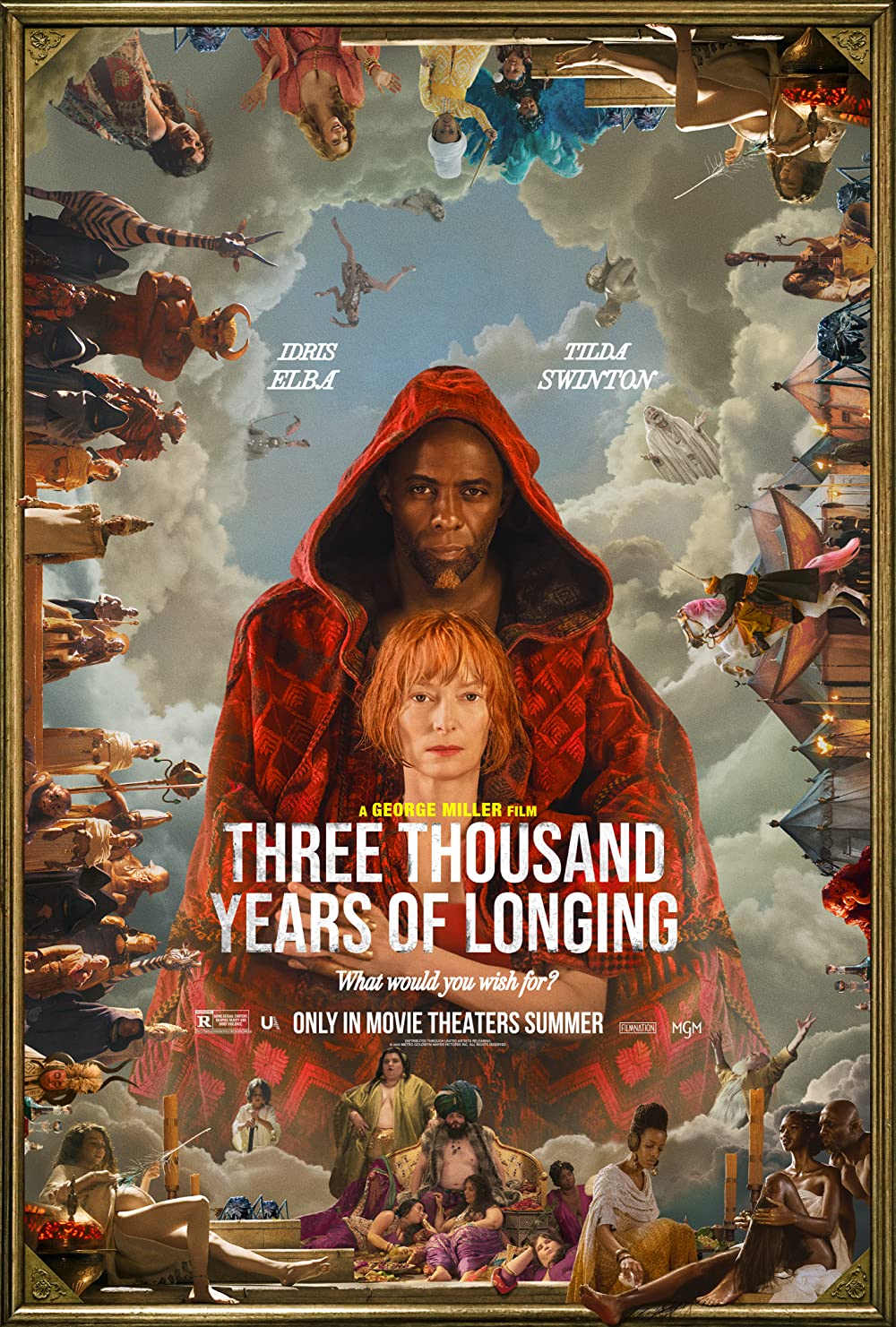Three Thousand Years of Longing
Three Thousand Years of Longing, 2022, 3 stars
Wish fulfillment
George Miller fashions an adult fairy tale
 Exclusive to MeierMovies, August 18, 2022
Exclusive to MeierMovies, August 18, 2022
If you had three wishes, what would you ask for?
I’m approaching 50, so my first request would probably involve youth. I might even ask to start aging backwards, like Benjamin Button. (It shouldn’t surprise you – especially if you’d read my reviews over the last 28 years – that I’d make a movie reference in this situation.)
The more relevant question is what will Tilda Swinton – or, more precisely, Alithea, her character in George Miller’s new film, Three Thousand Years of Longing – wish for when a djinn (or genie) unexpectedly appears. Her eventual wishes surprise both her and the djinn, but what will surprise you is that, for most of the film, the wishes are just a MacGuffin. Instead, the dual beating hearts of this fantastical tale are the djinn’s anthological retelling of his life and Alithea’s own philosophical outlook, which, prior to meeting the man in the bottle, was dominated by the belief that (thanks to science) the myths and monsters of the past have been “reduced to metaphor.”
Well, enter metaphor stage right, in the shape of Idris Elba. Alithea, a British narratologist, accidentally releases him while cleaning a decorative glass bottle she bought in an Istanbul antique shop. She’s in the Turkish metropolis to speak at a conference at which she will espouse her aforementioned theories on the obsolescence of magic. Considering her beliefs, her fantastical discovery might seem the height of irony – until you realize that a narratologist is just a fancy word for a storyteller. And the lonely and imaginative Alithea – if you buy this critic’s theory that most of the movie’s plot exists only in her mind – is about to tell a whopper.
Following the djinn’s release and a clever, metatheatrical discussion about the rules of wishing – “I am familiar with the concept,” she tells him – the djinn recounts his life, from his initial entrapment 3,000 years ago to his current predicament. Along the anthological way, we meet colorful characters from Middle Eastern history and folklore, along with a visually stunning collection of fantastical creatures. Indeed, the film might be suitable for kids if not for its existential subjects, mild violence and graphic eroticism. Aladdin, meet Guillermo del Toro.
None of the djinn’s tales are dramatically or emotionally significant enough to carry the film on their own, or even when combined. Instead, it’s the quiet moments and chemistry between Elba and Swinton – who, thankfully, is sans her familiar physical gimmickry – that sustain legendary Australian writer-director Miller’s visual epic.
Co-written by Augusta Gore, Longing is based on A.S. Byatt’s short story, The Djinn in the Nightingale’s Eyes. And its literary origins show, as the screenplay occasionally seems overstuffed. Still, the film succeeds largely because of imaginative art direction by Roger Ford, Nicholas Dare and Sophie Nash; otherworldly cinematography by John Seale; and a competent team of digital magicians.
At its best, Miller’s movie has something to say about its titular longing and even more to say about loneliness. (“We exist only if we’re real to others,” the djinn tells Alithea.) Even more impactful are the film’s thoughts on technology and why modern England is no country for old genies. But at its weakest, it suffers from narrative drift and some misplaced wokeness in the final act. Despite its unevenness, though, Longing is a contemplative story stuffed with other stories stuffed with an eclectic array of treasures.
This genie-in-the-bottle fantasy might not be everything you wish for, but it’s still a dream worth having. And if you are like Alithea, who “finds feelings through stories,” you might just turn into a narratologist yourself, if only for 108 minutes in a dark room.
© 2022 MeierMovies, LLC
For more information on this movie, visit IMDB and Wikipedia.